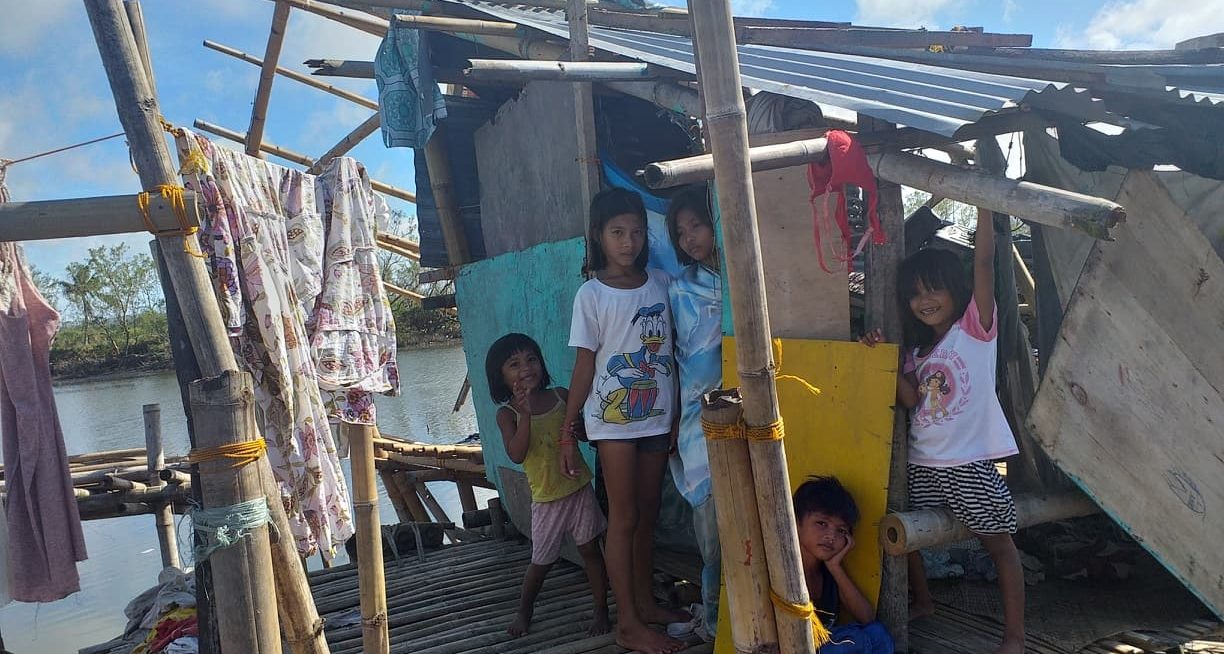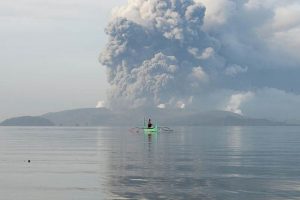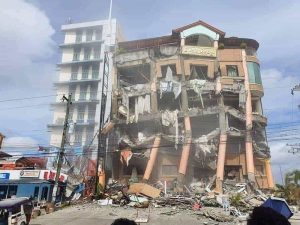Resiliency in the Face of Natural Disasters

Simple house made of light materials badly damaged after Typhoon Ursula – Libas, Roxas City
According to the World Bank, year after year, the Philippines has one of the highest number of natural disasters, due to its geographical location within Southeast Asia. Located along the pacific ring of fire, the Philippines is prone to frequent and strong earthquakes, volcanic eruptions (there are 24 active volcanoes in the Philippines), and an average of 20 typhoons each year, all of which cause damage to infrastructure, homes/businesses, and livelihoods, and often cause serious injuries, health complications, and death.
The Philippines, which is an archipelago of over 7,100 islands, is divided into three regions, namely Luzon (north), Visayas (central), and Mindanao (south). In the past number of months each region of the Philippines has been negatively impacted by sudden and devastating natural calamities. In Mindanao, they have been experiencing strong earthquakes measuring upwards of 7.0 on the Richter scale. The Visayas region (where we live) has had a couple of very strong typhoons in the past couple of months, namely Tisoy (Kammuri) and Ursula (Phanfone). And now, the Luzon region is experiencing the eruption of the Taal volcano.
In all of these cases, families have been displaced, people have been injured, houses and properties have been damaged or destroyed, infrastructure has been damaged, and livelihoods have been badly impacted. In the worst cases, lives have been tragically lost.
Despite these frequent damaging calamities, Filipinos remain resilient and determined to improve the quality of life for their families. When calamities like these strike, however, those who are poor are often the most vulnerable. Believe it or not, in times of trouble, corruption and unjust practices often exploit the poor, which causes them to fall deeper into cycles of debt and poverty. Alongside our global partners, Canadian Baptist Ministries (CBM) works to support the needs of the poor and stand against these injustices.
By scanning the world news, it doesn’t take long to realize that there are serious challenges facing countries and people groups all over the world. From the bush fires in Australia, ongoing refugee crisis’ in Syria, South Sudan, and Myanmar (Rohingya), flooding in northern India, or destructive cyclones in central Africa, around the world people are facing significant hardships.
With so many needs it’s hard to know how to respond. What can I do, what can you do, to help people around the world who are in need? It’s a fair question. At CBM, we work with local church partners around the world to bring hope, healing, and reconciliation to a broken world through word and deed. We certainly don’t have the capacity to respond to every crisis or natural disaster, but we can support our global partners as they seek to respond to the needs of others in their communities during these challenging times.

Taal Volcano (take 2 days ago): Photo credit to PhilStar

Mindanao earthquake damage: Photo credit to SunStar
As was already mentioned, the Philippines was hit by a major tropical storm on Christmas day (local Philippine time). Typhoon Ursula (International name – Phanfone) hammered the Visayas region making landfall in seven different places, including three provinces in Panay Island (Northern Iloilo, Capiz, and Aklan provinces). News agencies reported sustained heavy rainfall and destructive winds gusting upwards of 200 km/h, which caused significant damage to homes, livelihoods, as well as, loss of life.
Throughout the region there is extensive damage to homes, businesses, schools, and livelihoods such as the fisheries and agriculture. Many structures were damaged, and in some cases, were completely destroyed. Traditional homes made of light materials (bamboo, nipa roofing, sheet metal, etc.) suffered the greatest damage as they are not built to withstand these kinds of storms. The immediate need is to repair and/or rebuild homes that have been damaged or destroyed. Additionally, there will be a need to help rehabilitate livelihoods that have been impacted, especially farmers who have lost their crops or trees, and fisherfolk who have lost equipments, nets, boats, etc.
Our partners in the Philippines, Kabuganaan Philippines Ministries (KPM), in collaboration with the Convention of Philippine Baptist Churches Inc. (CPBC), are responding to the needs of individuals and families in Capiz province who were badly affected by typhoon Ursula. This relief and recovery effort will focus on providing needed food, building materials to repair or rebuild houses, and livelihood rehabilitation.
DONATE ONLINE NOW
For more information on CBM’s work around the world, including the Philippines, or to donate please visit www.cbmin.org or call 1-905-821-3533.
If you are interested in becoming a Partner-in-Mission with our family, please contact Barb Keys (bkeys@cbmin.org or call 1-905-821-3533) at Canadian Baptist Ministries. You can also visit their website at www.cbmin.org to give online or for more information. We are only able to follow God’s leading in our lives thanks to the monthly support of generous individuals and churches.
All donations of $10.00 or more will receive a charitable tax receipt at year end.
Thank-you!
Michael & Melanie
Kyla, Sean, Carter & Allie
























